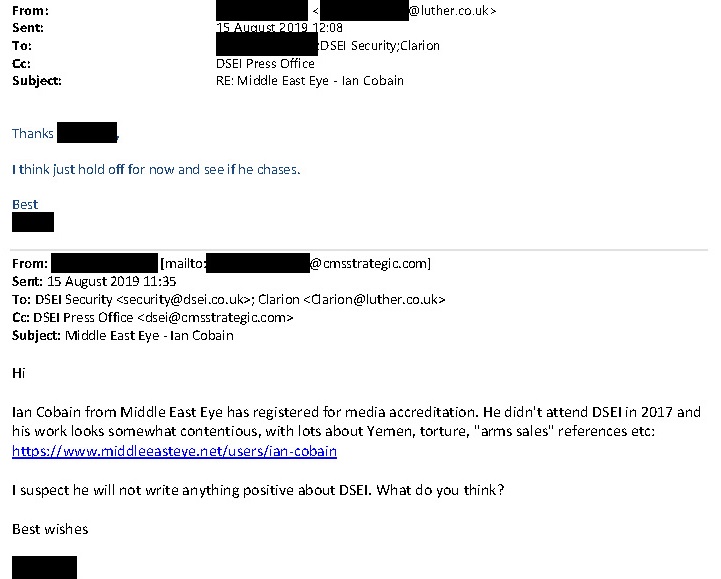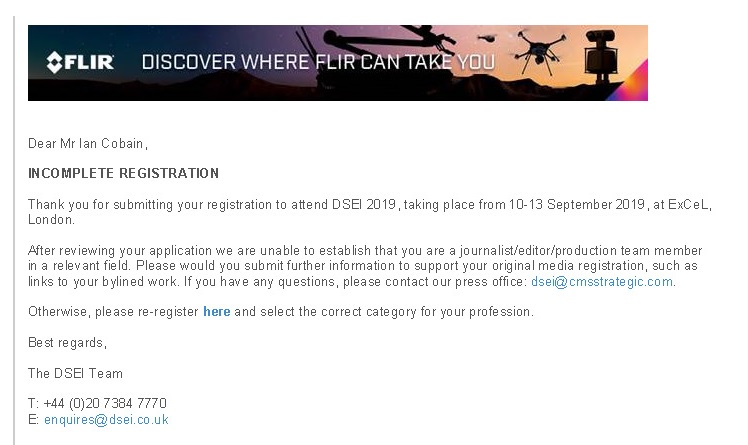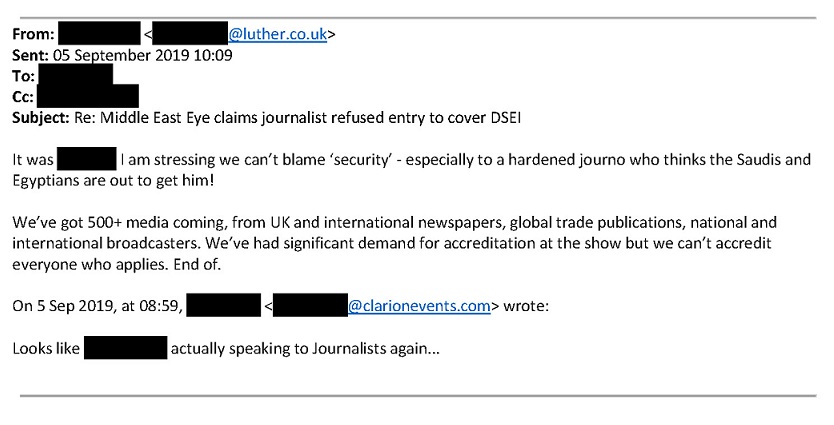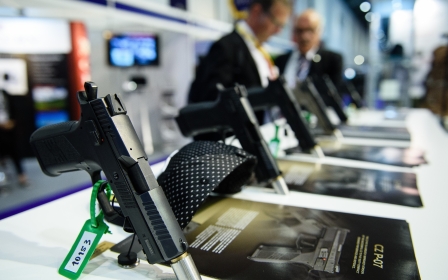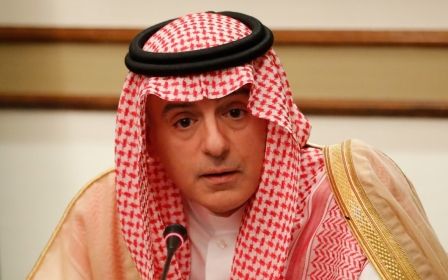'See if he chases': Why Ian Cobain was actually banned from covering UK arms fair
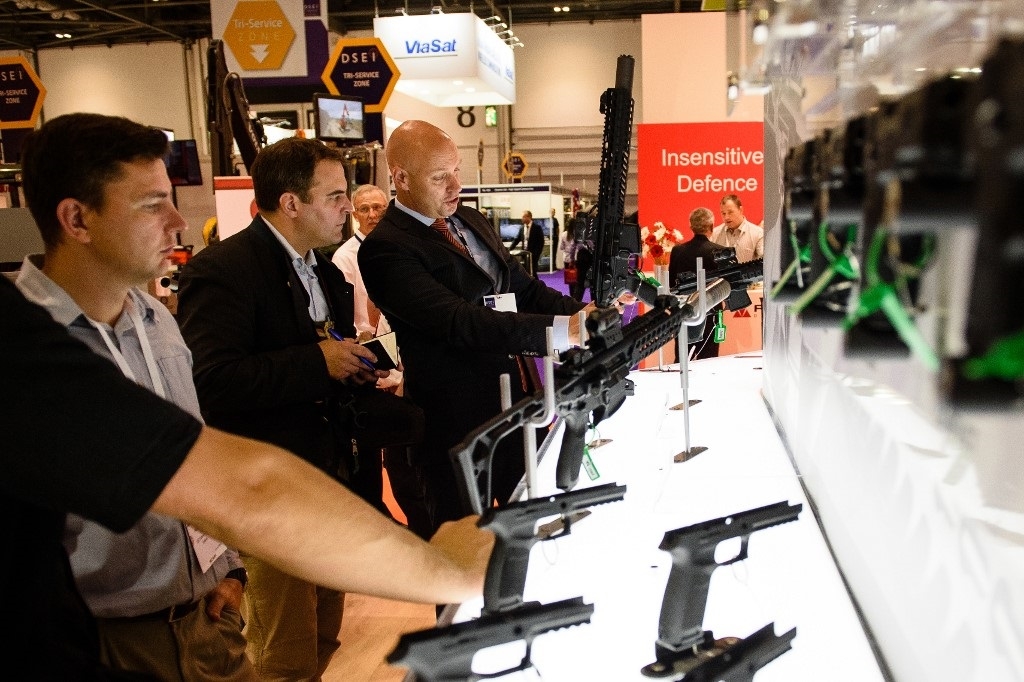
A Middle East Eye journalist was banned from covering a UK-government backed arms fair last month because organisers believed his coverage would “not be positive”, internal emails obtained by MEE show.
Ian Cobain, who has reported for more than 35 years and covered six wars, had been told by Defense and Security Equipment International organisers less than a week before the event that they could not establish he was a journalist “in a relevant field”.
Hours later, they officially rejected his application, saying they had “a very large number of applications” and had been unable to accredit everyone.
But redacted emails obtained by MEE through a subject access request show that weeks before they turned down Cobain’s application, organisers - which included events organiser Clarion Events and public relations agency CMS Strategic - had researched his reporting as well as his Twitter account.
The emails also disclosed the role played by a second public relations firm, Luther Pendragon, which advised the arms fair to bar Cobain. Publicly, the agency acts as a supporter of news media, sponsoring a journalism award and other media events. Behind the scenes, however, it was working to curtail media freedom.
New MEE newsletter: Jerusalem Dispatch
Sign up to get the latest insights and analysis on Israel-Palestine, alongside Turkey Unpacked and other MEE newsletters
“He didn’t attend DSEI in 2017 and his works looks somewhat contentious, with lots about Yemen, torture, “arms sales” references etc,” an employee with CMS Strategic wrote on 15 August, sharing a link to Cobain’s biography and recent stories on the MEE website.
“I suspect he will not write anything positive about DSEI. What do you think?”
Less than an hour later, an employee from Luther Pendragon responded: “I think just hold off for now and see if he chases.”
In another email also sent on 15 August, a member of DSEI’s security team wrote to Clarion Events and DSEI’s press office, sharing a 21 July tweet Cobain posted of a story which ran in the Independent about the upcoming arms fair.
“Found some articles that he has posted on his twitter page that isn’t in favour of the arms trade or DSEI,” the security team member wrote.
On 4 September, six days before the event, Cobain followed up his application, asking when he might hear back. A DSEI employee said the event’s security team had requested further information about him.
“Sorry, I’m slightly confused,” Cobain responded. “You say that the security team have requested further information from me – but I haven’t heard from the security team.”
The same employee wrote back saying Cobain should have received an email from DSEI, a copy of which the employee forwarded to him, which said organisers had been unable to establish whether he was a journalist in a relevant field, and requesting further information to support his application.
Cobain responded, saying he had not received the email, asking when it was sent and listing his MEE and Guardian profiles along with his Wikipedia page which he said “makes clear that I have been a journalist for more than 35 years”.
Less than two minutes later, a CMS Strategic employees writes to a Clarion employee and a member of DSEI’s security team: “This chap is chasing his media accreditation. Unless you advise otherwise, I am rejecting him today.”
DSEI’s press office responds: “If he rings office line just take a message and say someone will get back to him.”
The emails also show that Luther Pendragon penned a misleading statement that was given to the National Union of Journalists and a media trade journal, the UK Press Gazette. The statement wrongly implied that Cobain had not been been allowed into the arms fair because he was not a defence specialist.
Luther Pendragon, Clarion and CMS refused to answer any questions about the disclosed emails.
'Fudging journalistic scrunity'
DSEI has been held in the UK for over 20 years. It is now the world’s largest arms fair, attracting arms companies, military delegations, and protesters; and it is supported by the UK’s Ministry of Defence (MoD) and the Department for International Trade (DIT).
This year, the British government invited delegations from 68 countries, including eight governments featured on the government’s human rights watch list: Bahrain, Bangladesh, Columbia, Egypt, Israel, Pakistan, Saudi Arabia and Uzbekistan.
Anti-arms campaigners raised concerns over Saudi Arabia’s invitation given a UK court’s decision earlier this year to suspend new arms sales to the kingdom over concerns about the war in Yemen, a landmark ruling which Cobain reported for MEE.
The UK’s Court of Appeal ruled that the government had failed to assess whether there was a risk that equipment sold to Saudi Arabia might be used in violation of international humanitarian law in the conflict.
MEE asked the MoD on Wednesday if it was concerned that DSEI organisers had banned Cobain because his coverage wouldn’t be positive. An MoD press office employee directed MEE to the DIT saying they had handled the case and would need to comment.
'Not only did the organisers conspire to block entry in order to fudge journalistic scrutiny, they went on to misrepresent their reasons for doing so'
- Michelle Stanistreet, National Union for Journalists
MEE asked the DIT to comment on whether it was concerned that Cobain had been blocked over worries about his coverage, if it was aware that DSEI had blocked journalists for this reason and if that had been done at the department's request, and what steps it would take to ensure there would be media freedom at future DSEI events.
The DIT did not comment on the record by the time of publication, however MEE understands that it did not ask organisers to block journalists over coverage concerns.
Michelle Stanistreet, general secretary of the National Union for Journalists (NUJ), told MEE that it was “quite wrong for organisers to block journalists from their events because they fear what the reporter might report”.
When Cobain’s application was rejected, the NUJ wrote DSEI, asking organisers to reconsider his request as well as the application of a second NUJ member, Private Eye’s Solomon Hughes, whose access had also been denied despite covering the event three times previously.
Emails obtained in the subject access request show that NUJ received a response from a DSEI spokesperson saying that there had been “a high level of interest” and that priority would be given “to those with interests in the defence and security equipment sectors”.
Stanistreet said: “Not only did the organisers conspire to block entry in order to fudge journalistic scrutiny, they went on to misrepresent their reasons for doing so.
“The UK government are currently engaged in a global campaign to promote media freedom. It is incumbent on them to ensure fair and transparent processes are in place for journalistic accreditation and guarantee fair access to events they support and endorse”.
'The idea the vast halls, which can fit tanks and fighter jets, couldn't squeeze in a couple more journalists is absurd'
- Solomon Hughes, Private Eye
Hughes told MEE that he has also applied for a subject access request to obtain the emails and find out why he was excluded from covering the event. He said he, too, had been told that the fair was "full up".
"I've been to DSEI several times, and the idea the vast halls, which can fit tanks and fighter jets, couldn't squeeze in a couple more journalists is absurd. I suspect they didn't want anyone else who was even slightly critical of the arms trade inside," he said.
"It's wrong that the British government, who give extensive help to DSEI, can uncritically support this anti-free-press behaviour."
He added that the role that Luther Pendragon had played stood out among the information disclosed in the internal emails. "It looks like a dishonest attempt at censorship. I would recommend anyone in the media dealing with Luther Pendragon treats them with suspicion," he said.
'Learning for next time'
After Cobain had been told his application was rejected, two emails from the Kent-based Inkerman Group, which describes itself as an international business risk and intelligence company, were sent to Clarion Events, highlighting two MEE stories, reporting Cobain's rejection.
It was not immediately clear to MEE what role Inkerman played in DSEI or who had hired the group. Inkerman had not responded to MEE's request for comment by the time of publication.
"Looks like [redacted name] actually speaking to Journalists again . . ." a Clarion employee writes to a Luther Pendragon employee, apparently forwarding Inkerman's emails.
The Luther Pendragon employee responds: "I am stressing we can't blame 'security' - especially to a hardened journo who thinks the Saudis and Egyptian are out to get him!"
In a second email, the same employee says: "There is a learning for next time though as [redacted name] has clearly been telling various people their applications are now with 'the security team' which I don't think is the right message for the reasons below.
"Just needs to be a straight 'your application is being processed in the future'. Less the better!"
Middle East Eye delivers independent and unrivalled coverage and analysis of the Middle East, North Africa and beyond. To learn more about republishing this content and the associated fees, please fill out this form. More about MEE can be found here.


